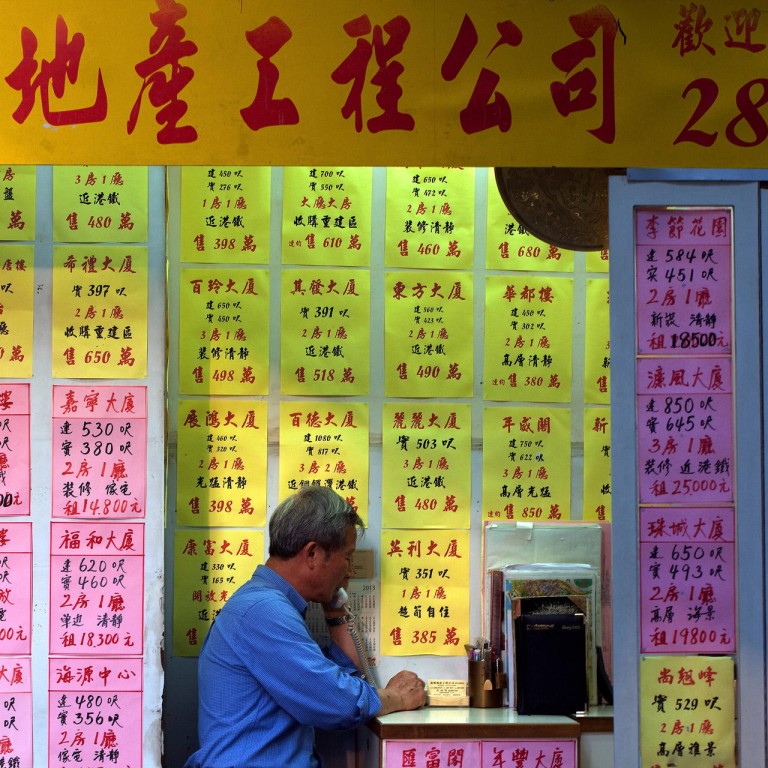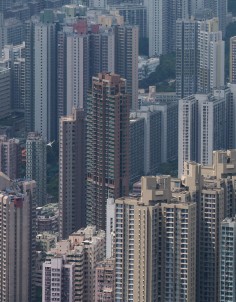
Interest rate rise fuels Hong Kong property market correction debate
Some say HK home prices may drop up to 15pc next year but others see stable market until 2017
The debate over whether a potential interest rate rise next year and a growing supply of flats will put an end to 10 years of increases in home prices in Hong Kong is intensifying, with much attention focused on the possibility of a market correction.

Average home prices have soared 268 per cent from HK$2,428 per square foot in August 2003, when prices bottomed out after plunging 70 per cent from the market peak in 1997, to HK$8,941 last month, based on saleable area, data compiled by Midland Realty showed.
So far this year, flat values have gained 2.6 per cent.
Forecasts by CBRE and the Royal Institution of Chartered Surveyors suggest the upward trend will not be sustained next year.
"The US Federal Reserve's tapering of monthly bond purchases is likely to lead to increased mortgage rates in Hong Kong, reducing the affordability of residential real estate," said Craig Shute, senior managing director at CBRE Hong Kong, Macau and Taiwan. "This may in turn lead to downward pressure on residential capital values."
The latest announcement by the Fed revealed that although bond purchases would be reduced from next month, the degree of the tapering would be relatively low, he said.
"This means the effect on lending rates may be limited," he said. "The tapering is set to continue as unemployment falls in the United States, which means we may see further increases in lending rates through 2014."
With more than 30,000 residential units potentially hitting the market next year, Shute said it was possible some developers would offload stock before lending rates increased further.
"The combination of increasing rates and new residential supply being sold at discounted prices may lead to a mass-market price correction of 5 to 10 per cent by the end of the second quarter of 2014," he said.
RICS said home values appeared to be 30 to 40 per cent overvalued, based on its preliminary estimate.
Prices now have surpassed the 1997 peak by 15 per cent, with speculative fever having driven flat values to a new high. That led to the government doubling stamp duty for flats and non-residential properties worth more than HK$2 million in late February to head off a property bubble. But the extra stamp duty does not apply to first-time individual buyers.

The government's curbs saw residential transactions in the secondary market tumble to 17,872 between June and December 19, Midland Realty said. It said the half-year total was likely to be worse than the 18,900 deals registered in the first half of 2003, when the city was in the grip of the Sars outbreak.
There were 23,039 deals recorded in the secondary market in the first half of this year.
Flat values surged 7 per cent in the three months to March but started to decline after the cooling measures dented demand. The 2.6 per cent increase in home prices this year compares with a 23 per cent gain last year.
Andrew Lawrence, managing director of real estate equities research at Malaysia-based investment bank CIMB Securities, forecast earlier that home prices would decline 10 to 15 per cent next year, and a further 15 to 20 per cent in 2015.
However, Bocom International and BNP Paribas predicted flat values would remain stable next year.
Alfred Lau, an analyst at Bocom International, said a potential interest rate increase in the US should be a gradual process, spanning three to four years, and Hong Kong was still under inflationary pressure, partially imported because of the appreciation of the yuan.
"We expect nominal income to continue to grow at 5 per cent per year, which will offset the downward pressure, if the potential rate rise is spread across the next three to four years, or an increase of about 75 basis points each year," he said.
This would be similar to the rate increases in 2005, when the mortgage rate rose 310 basis points in 13 months, and in 2011, when home lending rates were raised by 120 basis points in four months. Property prices remained flat on those occasions.
Lau said he expected home prices to remain at current levels until 2017.
After the recent 10 to 15 per cent price cuts for new luxury units, BNP expected prices to stay relatively stable next year before possibly resuming a more moderate revival in 2015.
